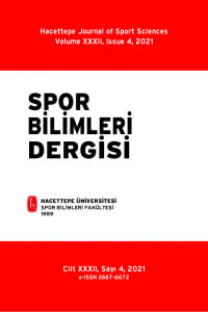YÜZÜCÜLERDE BESLENME.
Beslenme, sporcu performansını önemli ölçüde etkiler. Antrenman ve yarış öncesi, sırası ve sonrası miktar ve kalite açısından yeterli bir diyet, performansı en üst seviyeye çıkarır. En uygun sportif performans için beslenme konusundaki sorular 100 yıldan daha uzun süredir bilimsel olarak tartışılmaktadır. Giderek özel spor dalları ile uğraşan sporcular, spor beslenme uzmanlarından belirli ihtiyaçlarını nasıl karşılayacak/arını öğrenmek istemektedirler. Diğer sporcularda oldugu gibi yüzücü/er de, günlük aktivitelerini sürdürmek ve antrenman ile yarış için gereksinmeleri olan yeterli enerji alımlarıyla birlikte dengeli bir diyete ihtiyaç duyarlar. Bu çalışma, yüzücü/erin temel beslenme ilkeleri üzerine ışık tutacaktır
Anahtar Kelimeler:
-
YÜZÜCÜLERDE BESLENME.
Keywords:
-,
___
- Adams, M.M., Porcello, L.P. &Vivian, V.M. (1982). Effect of a supplement on dietary intakes of female collegiate swimmers. Physician and Sportsmedicine, 10,122-134.
- Almeras, N., Lemieux, S., Bouchard, C. & TremblayA. (1997). Fat gain in female swimmers. Physiol Behav, 61,811-817.
- Berning, J. (1986). Swimmers' nutrition, knowledge and practice. Sports Nutr News,4,1-4.
- Brigham, D.E., Beard, J.L., Krimmel, R.S.
- & Kenny, W.L. (1993). Changes in
- iron status during competitive season
- in female collegiate swimmers.
- Nutrition, 9, 418-422.
- Burke, L.M. (2001). Nutritional needs for
- exercise in the heat. Comp Biochem
- PhysiolA, 128,735—48.
- Burke, L.M., Kiens, B. & Ivy, J.L. (2004).
- Carbohydrates and fat for training
- and recovery. J Sports Sci, 22, 15-30.
- Carrol, C. (2000). Swimming. In Rosenbloom CA. (Eds). Sports Nutrition. A Guide for the Professional Working with Active People. 3rd edition. (pp. 653-666). Illinois: The American Dietetic Association.
- Cheuvront, S.N. (1999). The Zone Diet and Athletic Performance. Sports Med, 27, 229-40.
- Clarkson, PM. (1992). Minerals: Exercise Performance and Supplementation in Athletes. In Williams C., Devlin JT. (Eds). Foods, Nutrition and Sports Performance. (pp.113-146). London: E & FN Spon.
- Coleman, E. (2000). Carbohydrate and exercise. In Rosenbloom C.A. (Eds) Sports Nutrition. A Guide for the Professional Working with Active People. 3rd edition. (pp 13-31). Illinois: The American Dietetic Association.
- Costill, D.L., Flynn, M.G. & Kinivan, J.P. (1988). Effects of repeated days of intensified training on muscle glycogen and swimming. Med Sci Sports Exerc, 20, 249-254.
- Costill, D.L., Sherman, W.M., Fink, W.J., Maresh, C., Witten, M. & Miller, J.M. (1981). The role of dietary carbohydrates in muscle glycogen resynthesis after strenuous running. AmJClin Nutr,34,1831-1836.
- Günay, M. & Cicioğlu, |. (2001). Spor Fizyolojisi. Gazi Kitabevi, Ankara.
- Hawley, J.A. & Williams, MM. (1991). Relationship between upper body anaerobic power and Freestyle swimming performance. Int J Sports Med, 12,15.
- Hope, A., Aanderud, L. & Aakvaag, A. (2001). Dehydration and body şuid- regulating hormones during sweating in warm (38 0C) fresh-and seawater immersion. J Appl Physiol, 91 ,1529- 1534.
- Hopwood, M.J., Graham, K. & Rooney, KB. (2006). Creatine supplementa- tion and swim performance: A brief review. J Sports Sci & Med, 5, 10- 24.
- Institute of Medicine. (2002). Dietary Reference Intakes for Energy,
- Carbohydrate, Fiber, Fat, Fatty
- Acids, Cholesterol, Protein, and
- Amino Acids. Washington DC: NationaIAcademies Press.
- Juhn, M.S., O'Kane, J.W. & Vinci, D.M. (1999). Oral creatine supplementa- tion in male collegiate athletes: A survey of dosing habits and side effects. J Am Diet Assoc, 99, 593- 596.
- Krauss, R.M. EckeI, R.H., Howard, B., Appel, L.J. Daniels, S.R. Deckelbaum, R.J. Erdman, J.W. Kris- Etherton, P., Goldberg, I.J., Kotchen, T.A., Lichtenstein, A.H. Mitch, W.E., MuIIis, R., Robinson, K., Wylie- Rosett, J., Jeor, S., Suttie, J., Tribble, D.L. & Bazzarre, T.L. (2000). AHA Dietary Guidelines: Revision 2000: A statement for healthcare pro- fessionals from the Nutrition Committing of the American Hearth Association. Circulation, 102, 2284- 2299.
- Lamb, D.R., Rinehardt, K.F., Bartels, R.L., Sherman, W.M. & Snook, J.T. (1990). Dietary carbohydrate and intensity of interval swim training. Am J Clin Nutr, 52, 1058-1063.
- Lemon, P.W. (1996). Is increased dietary protein necessary or beneficial for individuals with a physically active Iifestyle? Nutr Rev, 54 (suppl), 169- 175.
- Lowery, L.M. (2004). Dieraty fat and
- sports nutrition: A primer. J Sports Sci&Med,3,106-117.
- Maher, J.T. (1999). Dietary Supplements Aimed at Enhancing Performance: EfŞcacy and safety consideration. The Role of Protein and Amino Acids in Sustaining and Enhancing Performance. Institute of Medicine. (pp.331-340). Washington DC: National Acamedy Press.
- McArdle, W.D., Katch, F.|. & Katch, V.L. (1996). Exercise Physiology: Energy, Nutrition and Human Performance. 4th edition. (pp. 180- 185). USA: Williams &WiIkins.
- Powers, S.K. & Howley, E.T. (2004). Exercise Physiology: Theory and Application to Fitness and Performance. 5th edition. Boundary Row, London, McGraw Hill Comp.
- Sharma, V.M., Sridharan, K., Pichan, G. & Panwar, M.R. (1986). Influence of heat-stress induced dehydration on mental functions. Ergonomics, 29, 791-799.
- Sherman, M.W. & Maglischo, E.W. (1991). Minimizing “chronic athletic fatigue" among swimmers: Special emphasis on nutrition. Sports Sci Exch, 4, 35.
- Soares, M.J., Satyanarayana, K., Bamji, M.S., Jacob, C.M., Ramana, Y.V. & Rao, S.S. (1993). The effect of exercise on the riboflavin status of adult men. BrJ Nutr, 69, 541-551.
- Theriault, D., Richard, D., Labrie, A. & Theriault, G. (1997). Physiological and psychological variables in swimmers during a competitive season in relation to the overtraining syndrome (abstract). Med Sci Sports Exerc, 29 (suppl), 1237.
- VoIek, J., Kraemer, W.J. & Bush, J.A. (1997). Creatine supplementation enhances muscular performance during high-intensity resistance exercise. J Am Diet Assoc, 97, 765-776.
- VoIpe, S. (2000). Vitamins and minerals for active people. In Rosenbloom CA. (Eds) Sports Nutrition. A Guide for the Professional Working with Active People. 3rd edition. (pp. 63- 93). Illinois: The American Dietetic Association.
- Başlangıç: 1990
- Yayıncı: Süleyman BULUT
